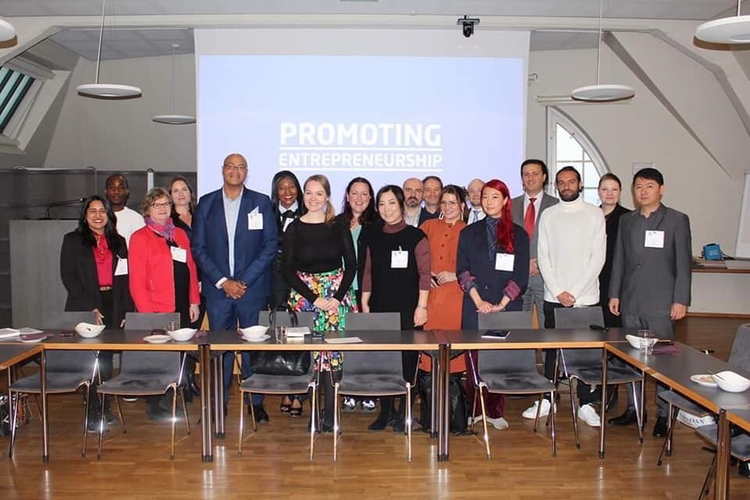YRITTÄJÄ, tule mukaan omiesi pariin! Liity Yrittäjiin.

Minister of Finance Katri Kulmuni invites immigrant entrepreneur network management team to lunch – hears hopes for a change in attitude and a little support for entrepreneurship
Minister Kulmuni met the management team of the immigrant entrepreneur network and heard their suggestions for improvements. Attitude decides everything, but small practical improvements would also be steps in the right direction.
The management group of the Suomen Yrittäjät immigrant entrepreneur network met Minister of Finance Katri Kulmuni on Wednesday over lunch to discuss entrepreneurship and, in particular, the conditions for and barriers to immigrant entrepreneurship and growth.
Kulmuni is meeting other interest groups, too, but the immigrant entrepreneur network management team had the honour to be invited first.
“This government has two major objectives: raising employment and tackling climate change. They are interconnected.”
The minister said that the dynamics of industrial relations are a big topic of discussion at the moment. After a short presentation, Kulmuni wanted to listen to and chat with her guests.
A little extra support
Suomen Yrittäjät network manager Aicha Manai reminded those present about some basic facts: Immigrant entrepreneurs employ 30,000 people in Finland and many immigrants employ themselves. Immigrant entrepreneurs are also readier than others to hire people from a range of backgrounds.
For immigrant entrepreneurship to advance, it needs additional support.
In recent years, more information and webinars in English have been added to the Suomen Yrittäjät website, and the organization holds events and cooperates with several partners.
“The tone of public discussion needs to become more positive, diverse backgrounds need to be better considered and we need brave structural reforms,” Manai said.
The network management group proposes faster, easier residence permits and automatic work permits for foreign students. The group feels the so-called labour availability consideration should be dropped entirely, as entrepreneurs know better than the unemployment office what kind of workers they need.
In particular, more information and language services are needed to allow entrepreneurs who do not speak the local languages make progress in their operations. Manai says that information about starting a business is available, but support is needed for developing business skills afterwards.
“For example, InfoFinland is a hub of necessary information, but it doesn’t have much information on entrepreneurship,” Manai says.
Attitudes a topic of discussion
According to Ali Giray, the chairperson of the immigrant entrepreneur network management group, Finland needs immigrants at work, but they need a little help.
“The help doesn’t need to be huge, because the attitude is more important”, Giray said.
Several management group members had experiences and opinions about the atmosphere of attitudes. Finland is a very qualifications-focused country and foreign degrees, for example, are often not sufficient in Finland. Instead, becoming qualified requires additional study, sometimes even in Finnish.
“Finns place very high demands on people and often disregard the fact that people have a background and experience from the past. Young people might lose their faith in the system right from the start, meaning they don’t want to be an active part of society,” Giray said.
Gradual progress in practical matters
Manai points out that progress has been made on working visas, but not those for entrepreneurs.
“An entrepreneur can be asked for a rental lease and a client contract before they even move to the country. Realistically, who would do business with me if I didn’t live in the country?” Manai asks.
“In the Netherlands they assign entrepreneurs a mentor from the local chamber of commerce for a year, during which they learn the ins and outs of doing business locally. We’d like to see Finland moving from prior control to retrospective control,” Manai says.
Examples from other countries could also be examined to improve the start and attractiveness of entrepreneurship.
Guests at the lunch also talked about advance taxes, start-up funding and social security.
“Before I’d sold anyone anything, I was €400 in the red,” Pamela Spokes said.
Not all of the matters raised fall within Minister Kulmuni’s remit, but the entrepreneurs appreciated the opportunity to express their thoughts. The minister said that the present social security system does not meet modern needs and requires an overhaul.
“We’re trying to reduce bureaucracy between ministries and strengthen a good, supportive atmosphere for entrepreneurship,” she said.
Elina Hakola
elina.hakola (at) yrittajat.fi